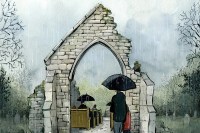Murray Sayle, who died last weekend, wrote regularly for The Spectator. Here is an edited extract from his column of 13 May 1989.
Aikawa, near Tokyo
The night of 19 December last was cold and starry. Our house stood in a clearing in a pine forest halfway up a mountainside, and the flames could be seen a good
ten miles away, down by the Nissan factory. Some of them even downed tools for a moment or two, we heard, wondering what the bright light was.
Not that fires are unusual in Japan. Before the days of concrete cliffs they were called ‘The Flowers of Edo’, the old name of Tokyo. Traditional Japanese houses are built of massive
wooden beams to sway with earthquakes, with two-inch-thick straw mats on the floors, papered room dividers, thatched roofs and wooden shutters to keep out the rain. You have to heat them somehow,
and the choice is electricity, charcoal or paraffin — we had a full 200-litre tank in the garden. Add pots of paint and varnish, a 15-year accumulation of books and files, records,
children’s and adults’ toys, winter clothes, bamboo furniture and three television sets and we have, or rather had, a dwelling as flammable as a box of matches.
The fire started in the children’s room at suppertime. An electric blanket had been switched on minutes before; nothing more is known of its cause. My wife, Jenny, went to investigate, found
a bunk bed ablaze, emptied a fire extinguisher on it, pitched the smouldering remains of a futon out and returned to see flames in the rafters. She took the children to a neighbour’s and
returned to find the house alight from end to end.
The fire brigade, informed by telephone that a house (uchi in Japanese) was on fire, cruised the village looking for a nonexistent Mr Uchida until it was suggested that the fiery beacon on the
hillside might interest them. Some kind soul had dumped builder’s rubble on the nearest fire hydrant and by the time the amateur firemen found another, 34 minutes later, nothing of the house
was standing. Jenny drove the family car out of the blazing garage moments before it too went up. The fire melted aluminium, twisted stainless steel and welded a kettle to the remains of the
kitchen stove. Apart from a word-processor grabbed from our office by a brave neighbour and some emergency funds Jenny kept in the refrigerator, nothing usable was saved from the house. It was, the
firemen told our neighbour, the hottest house fire they had ever seen.
In the olden days, we were told, a bronze gong would have sounded at our local Buddhist temple to inform the people that something of general concern was afoot. Our village is moving with the
times, and now we have a loudspeaker system installed on trees and telephone poles which summons the part-time firemen, announces delays in school hours caused by typhoons, floods or deep snow,
calls for volunteers to clear the roads, reports traffic accidents, tells children when it’s time to go home for supper and generally keeps everyone in touch. Our local electronic media, we
later learnt, got an early news-break on the fire at the foreigner Sayru-San’s house and called the buraku-kai, the village association, into action.
Buraku-kai have run the affairs of Japanese villages since long before the days of the Shoguns and, apart from the unregretted war years when they were pressed into government service to inform on
grumblers and dissidents, they bring a purely village consensus to bear on quarrels, family disputes and minor misadventures. Japanese villages as a result have no lawyers, and no use for them. We
can’t remember ever actually joining it, but one day there was the name Sayru on a wooden tablet hung up to indicate we were next to sort the recyclable garbage. Somehow, without anyone ever
actually saying so, we had been accepted.
As a result, we knew by sight many of the people who gathered within minutes around the flickering embers of our house. The women brought rice, soybean cakes and bottles of sake, the all-purpose
Japanese emergency rations, and explained soothingly that everyone could do with a drink and a bite to eat. After several bids had been put in, Jenny and the children were escorted to the house of
a neighbour whose children go to the local primary school with ours. At about 10 p.m. the deputy headmaster of the school, no less, arrived to check that our two older children had clean underwear
and school bags (other neighbours had arrived with both) and would be ready to join their group for the normal walk to school (compulsory in Japan) at the usual time. The police and firemen called
and took statements while everybody’s mind was fresh, and it was suggested that we get a good night’s sleep as we all had a big day tomorrow.





Comments